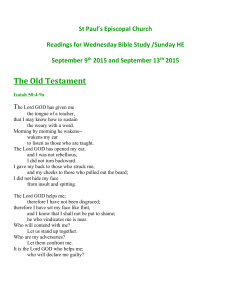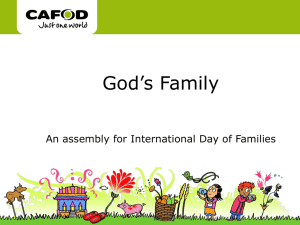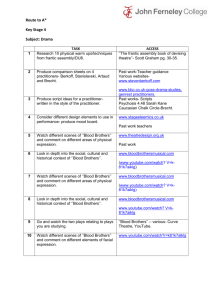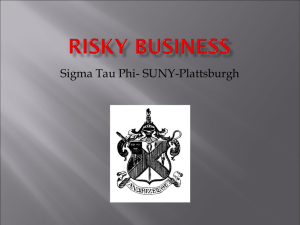Homily at the occasion of the profession in Maria
advertisement
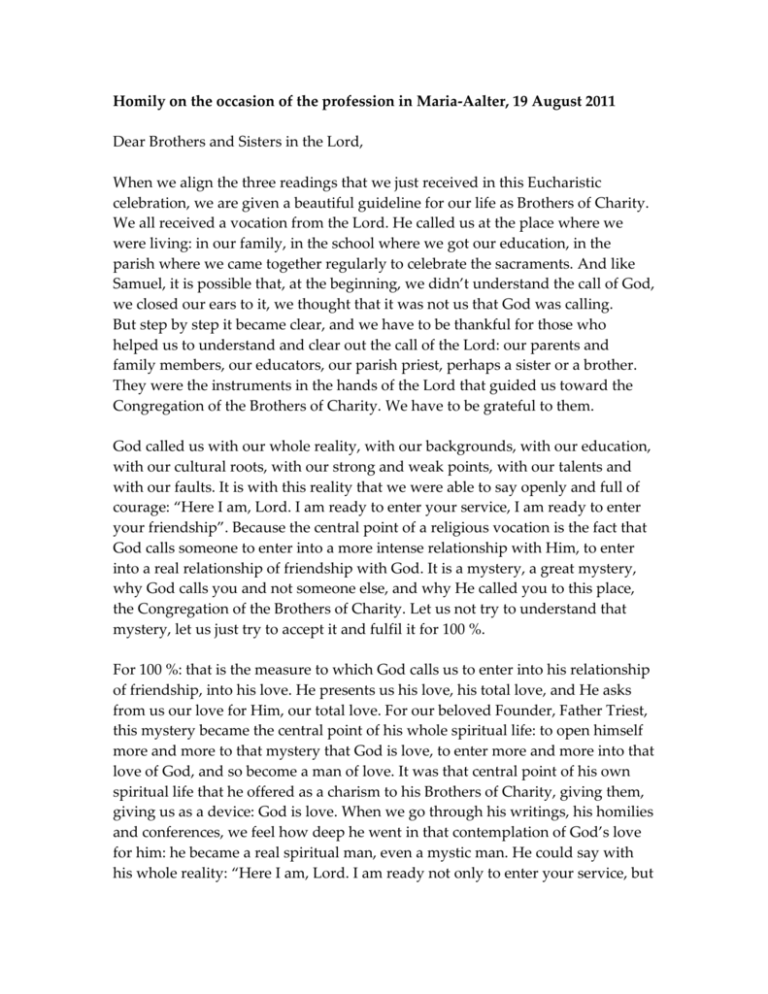
Homily on the occasion of the profession in Maria-Aalter, 19 August 2011 Dear Brothers and Sisters in the Lord, When we align the three readings that we just received in this Eucharistic celebration, we are given a beautiful guideline for our life as Brothers of Charity. We all received a vocation from the Lord. He called us at the place where we were living: in our family, in the school where we got our education, in the parish where we came together regularly to celebrate the sacraments. And like Samuel, it is possible that, at the beginning, we didn’t understand the call of God, we closed our ears to it, we thought that it was not us that God was calling. But step by step it became clear, and we have to be thankful for those who helped us to understand and clear out the call of the Lord: our parents and family members, our educators, our parish priest, perhaps a sister or a brother. They were the instruments in the hands of the Lord that guided us toward the Congregation of the Brothers of Charity. We have to be grateful to them. God called us with our whole reality, with our backgrounds, with our education, with our cultural roots, with our strong and weak points, with our talents and with our faults. It is with this reality that we were able to say openly and full of courage: “Here I am, Lord. I am ready to enter your service, I am ready to enter your friendship”. Because the central point of a religious vocation is the fact that God calls someone to enter into a more intense relationship with Him, to enter into a real relationship of friendship with God. It is a mystery, a great mystery, why God calls you and not someone else, and why He called you to this place, the Congregation of the Brothers of Charity. Let us not try to understand that mystery, let us just try to accept it and fulfil it for 100 %. For 100 %: that is the measure to which God calls us to enter into his relationship of friendship, into his love. He presents us his love, his total love, and He asks from us our love for Him, our total love. For our beloved Founder, Father Triest, this mystery became the central point of his whole spiritual life: to open himself more and more to that mystery that God is love, to enter more and more into that love of God, and so become a man of love. It was that central point of his own spiritual life that he offered as a charism to his Brothers of Charity, giving them, giving us as a device: God is love. When we go through his writings, his homilies and conferences, we feel how deep he went in that contemplation of God’s love for him: he became a real spiritual man, even a mystic man. He could say with his whole reality: “Here I am, Lord. I am ready not only to enter your service, but I am also ready to enter your friendship with all my heart. You, God, are enough for me.” Father Triest guides us, guides you to take this famous first step in our life, in your life: this opening up and entering with our whole reality that mystery of God is love, in such a way that, in the end, we can say: “Yes, God, I believe in you, I love you, I know that you are there for me with your love. You alone are enough for me. Here I am, Lord, you can send me.” A real mystic man always opens himself up to the whole reality, to everyone. Starting from his deep contemplation on God’s love, he looks at the reality around him in a new way, he discovers, he meets, he loves God in everyone and everything. And this is also the way that we are invited to follow. We, like Father Triest before us, have to continue our love for God in the love for our neighbour, in the love for the poor. As the Apostles in the Gospel reading, we are also sent into the world, to proclaim that the kingdom of God is near, and we must realise this kingdom of God in our special care for the poor, for those who have no experience of Gods love in their lives, for those who are forgotten by so many in society. In his time, Father Triest shared God’s love with poor elderly men at the Byloke in Ghent, with abandoned psychiatric patients at Gerard the Devil’s Castle in Ghent, with street children, orphans, with the blind and the deaf. They had to experience that the kingdom of God was also proclaimed for them, particularly for them. We have to share God’s love with the needy of today, and in every country where we are present as a congregation, there are so many who are waiting for our love, for our care, indeed, for that feeling and experience that God loves them through our concrete love for them. My dear novices and brothers who will renew their profession today, in order to bring God’s love into the world, you do not necessarily have to be a religious brother. Every Christian has received this vocation and mission through his baptism. But you, by and through your religious dedication, you are to become the specialists of God’s love, you have are to become real mystic men who live only for God’s love, ready to use all your talent for the development of the kingdom of God in the lives of the most abandoned and the most needy. That is the deeper meaning of your consecrated celibacy, the central point of your religious dedication, as a strong sign that your life is totally given to God and God alone. Do everything, with the grace of God, the support of your brothers and your own effort, to find profound joy in that love relationship with God and God alone. If your consecrated celibacy does not become the source of profound joy in your life, it will be difficult to be faithful to the vows that you will proclaim; the vows of poverty, obedience and chastity. If you do not find your real joy, your real satisfaction in God and God alone, you will try to find satisfaction in material goods, in worldly power, in all kind of enjoyments. And you can only find real joy in your relationship with God, if you cultivate that relationship through a deep spiritual, yes, a deep mystic life, a life of prayer and contemplation. My dear Brothers, we started our retreat in preparation for this day on the feast of the Assumption, that nice feast of Mother Mary. Let us always remember the three simple words spoken by Mary at the moment she received from God her special vocation and mission. Her first word was: ‘Ecce’, Here I am. With that word she opened herself to the message of God in her life, brought by the Archangel Gabriel. We also have to open ourselves up everyday, again and again, for the messages that God sends us. We can hear his messages in our prayer, in our daily lectio divina, in our contemplation. Develop that contemplative dimension in your life, because we all constantly need the messages of the Lord, our only guide. Her second word was: ‘Fiat’, Your will be done. It was the same word that Jesus, her Son, repeated so many times, until He died on the Cross. To live in accordance with the will of God, and to fulfil the will of God through our daily activities, through our apostolate, that is our fiat, which we also must express every day again and again. And her third word was: ‘Magnificat’. She was singing about her joy that God had done great things for her and with her. This was her humility: knowing that all that happened in her life, she owed to the grace of God. Yes, we also have to sing our magnificat every day, knowing that we are only instruments in the hands of the Lord, but that, with his grace, we might become good instruments, excellent instruments, true messengers of God’s love in the world. May the profession that you will express in this Eucharist be your ecce – fiat – magnificat, all at the same time, and let it sound through all the days of your life. Then, you will be real Brothers of Charity: brothers of the Lord, brothers of your brothers, brothers of the poor. All of them – the Lord, your brothers and the poor – they are waiting for you. Go, and proclaim that the kingdom of God is very near to you. Amen. Bro. René Stockman Superior General Brothers of Charity

